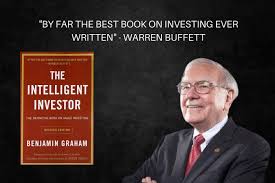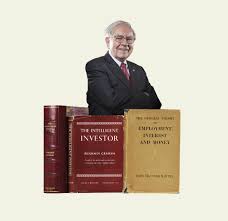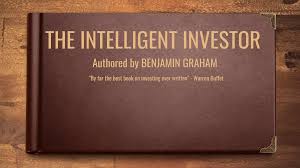
The Intelligent Investor: Key Lessons Rephrased and Simplified
Introduction
When it comes to investing, few books have shaped the financial world as profoundly as The Intelligent Investor by Benjamin Graham. First published in 1949, this timeless masterpiece is often referred to as the “bible of value investing.” Even today, investors—both beginners and experts—look to its wisdom for guidance.
Benjamin Graham, often called the “father of value investing,” didn’t just write about making money. He taught principles of discipline, patience, and rational decision-making. Perhaps one of the book’s biggest admirers is Warren Buffett, who credits much of his success to the lessons he learned from Graham.
This article rephrases the story and principles of The Intelligent Investor in simple terms. Whether you are just starting your investment journey or want to strengthen your financial knowledge, these lessons will help you think like an intelligent investor.

1. Who is an Intelligent Investor?
An intelligent investor is not someone with the highest IQ or the most complex strategies. Instead, Graham defines intelligence in investing as having the right attitude, discipline, and patience.
Key qualities of an intelligent investor include:
- The ability to stay calm when the market is unstable.
- Making decisions based on facts, not emotions.
- Focusing on long-term growth instead of chasing quick profits.
In other words, intelligence in investing is about mindset, not brilliance.
2. Mr. Market: Understanding Market Behavior
One of Graham’s most famous teachings is the idea of “Mr. Market.” He asks readers to imagine the stock market as a person who shows up every day offering to buy or sell shares at different prices.
- Sometimes, Mr. Market is optimistic and offers very high prices.
- Other times, he is pessimistic and offers very low prices.
- The intelligent investor doesn’t have to follow Mr. Market’s mood swings. Instead, they take advantage of opportunities when prices are low and avoid panic when prices are high.
Lesson: Don’t let market fluctuations control your decisions. Be rational, not emotional.
3. Investment vs. Speculation
Graham clearly separates investment from speculation:
- Investment: Buying assets after analyzing them carefully and expecting long-term growth.
- Speculation: Taking risks in hopes of quick profits without proper research.
He warns that speculation is like gambling—it may sometimes pay off, but it’s dangerous if confused with real investing.
Example: Buying shares of a company because of its strong financial history is investing. But buying a stock just because it is trending on social media is speculation.
Lesson: Intelligent investors are investors, not gamblers.

4. Margin of Safety: The Golden Rule
Perhaps the most powerful principle in the book is the idea of a “margin of safety.” This means buying investments at a price lower than their true value, so even if things don’t go as planned, you’re still protected.
Example: If you believe a company is worth ₹1,000 per share, but you buy it at ₹700, you have a margin of safety. Even if the company faces short-term troubles, you’re less likely to lose money.
Lesson: Always give yourself a cushion. Don’t invest in assets that are priced too close to their maximum value.
5. Defensive vs. Enterprising Investor
Graham classifies investors into two types:
5.1 The Defensive Investor
- Prefers safety over high returns.
- Invests in stable companies, bonds, or index funds.
- Doesn’t spend much time analyzing the market.
5.2 The Enterprising Investor
- Willing to put in more effort and research.
- Looks for undervalued stocks.
- Ready to take slightly higher risks for better rewards.
Lesson: Choose your path wisely. If you don’t have time or interest in studying the market deeply, be a defensive investor.
6. The Role of Emotions in Investing
One of the biggest challenges in investing is controlling emotions. Fear and greed can destroy even the best plans.

- Fear makes people sell investments too early during downturns.
- Greed makes people chase overpriced stocks during booms.
Lesson: Emotional discipline is more important than financial knowledge.
7. The Importance of Research
Before investing in any company, Graham advises thorough analysis. You should understand:
- The company’s earnings history.
- Its financial stability.
- Its long-term potential.
Lesson: Never invest blindly. Knowledge is your best defense.
8. Dividends and Long-Term Growth
Graham highlights the importance of companies that pay regular dividends. Dividends not only provide income but also show that a company is financially healthy.
At the same time, he encourages long-term growth by reinvesting earnings rather than chasing short-term gains.
Lesson: Look for companies with a history of stability and growth.
9. Inflation and Investment Strategy
Inflation reduces the value of money over time. Graham warns investors to prepare for this by:
- Diversifying into stocks, bonds, and other assets.
- Avoiding putting all money in cash.
Lesson: Protect your wealth by planning for inflation.
10. Key Takeaways for Modern Investors
Although The Intelligent Investor was written decades ago, its wisdom is still relevant today. Modern investors can learn:
- Patience pays off. Wealth grows over years, not overnight.
- Diversify investments. Never put all your money in one place.
- Think independently. Don’t follow the crowd.
- Stick to fundamentals. Trends may come and go, but solid companies survive.
11. Real-Life Application Examples
Example 1: The Dot-Com Bubble (2000)
During the dot-com boom, investors rushed to buy internet company stocks without analyzing fundamentals. When the bubble burst, many lost fortunes. Those who followed Graham’s principles of margin of safety and value investing avoided major losses.
Example 2: Warren Buffett’s Investment Strategy
Buffett, Graham’s most famous student, consistently applies value investing. He buys undervalued companies with strong fundamentals and holds them long-term. His success is living proof of Graham’s teachings.
Example 3: Market Crashes
During crises like the 2008 financial crash or the 2020 pandemic, panic selling caused massive losses. Intelligent investors who stayed calm and invested during low prices made strong gains later.
12. How to Apply These Lessons in Your Life
- Set clear goals: Decide whether you want steady returns (defensive) or higher growth (enterprising).
- Do your homework: Research companies before buying shares.
- Control emotions: Don’t panic during downturns or get greedy during booms.
- Use margin of safety: Always buy with a cushion of protection.
- Be patient: Wealth-building is a marathon, not a sprint.
Conclusion
The Intelligent Investor is more than just a finance book—it is a guide to rational thinking and disciplined decision-making. Benjamin Graham’s timeless principles remind us that success in investing doesn’t depend on luck, but on patience, research, and emotional control.
Whether you are a beginner saving for the future or an experienced investor seeking to refine your strategy, Graham’s wisdom offers a clear path. By practicing value investing, maintaining a margin of safety, and resisting emotional impulses, you can truly become an intelligent investor.
❓ Frequently Asked Questions (FAQ)
1. Is The Intelligent Investor still relevant today?
Yes, the principles in The Intelligent Investor are timeless. Although markets have changed since the book was first published, concepts like value investing, margin of safety, and long-term discipline remain highly effective.
2. What is the main lesson from The Intelligent Investor?
The core lesson is that successful investing depends more on mindset than on intelligence. Investors should focus on patience, discipline, and avoiding emotional decisions. Buying undervalued assets with a margin of safety is the foundation of intelligent investing.
3. Who should read The Intelligent Investor?
This book is ideal for anyone who wants to build wealth steadily, from beginners learning the basics of investing to advanced investors seeking to strengthen their strategies. Even Warren Buffett has called it the best book on investing ever written.
4. What is the difference between investment and speculation?
Investment involves careful research and buying assets for long-term growth, while speculation is more like gambling—chasing quick profits without proper analysis. Graham emphasizes that an intelligent investor should avoid speculation and focus on real value.
5. How does the “Mr. Market” concept help investors?
Mr. Market is a metaphor for the stock market’s mood swings. Sometimes he offers high prices, and sometimes low. Intelligent investors don’t blindly follow these moods; instead, they buy when prices are attractive and remain calm when prices fall.
For the Latest Jobs Notifications: Click Here
Join With Us On WhatsApp: Click Here
Join With Us On LinkedIn: Click Here
Free Python Learning: Click Here